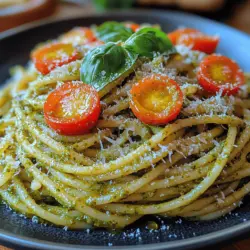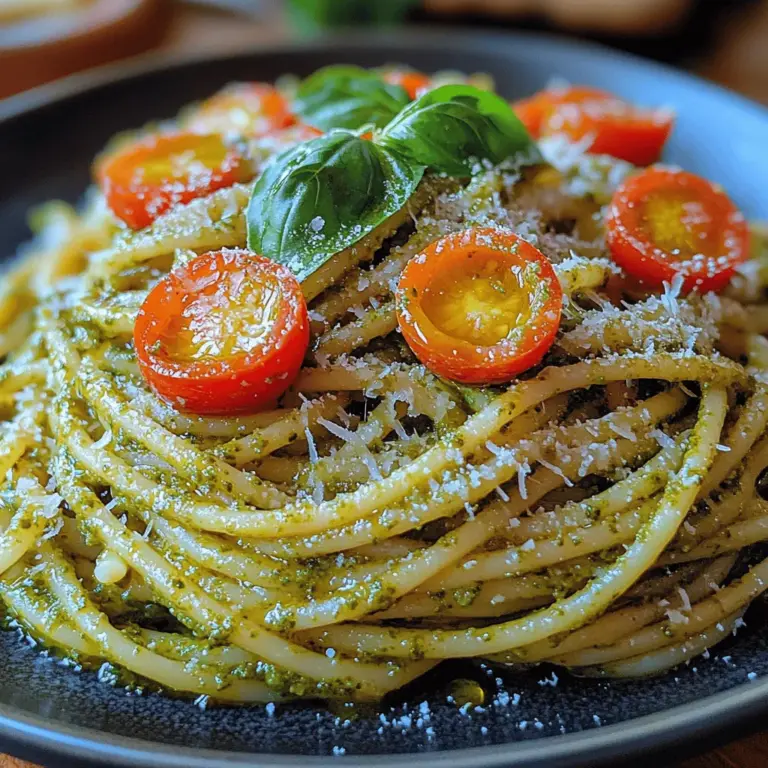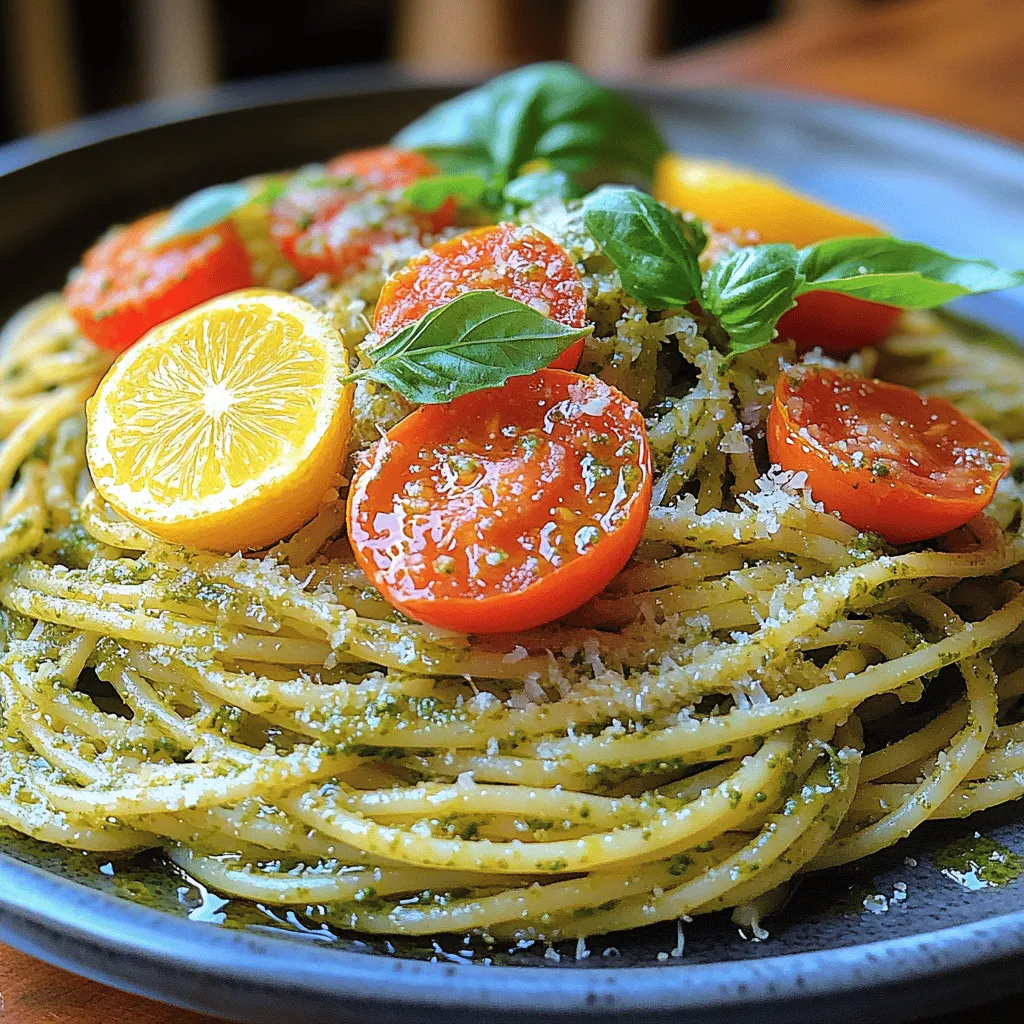Introduction
Pasta dishes are a beloved staple in kitchens around the world, celebrated for their versatility and comforting qualities. From rich, creamy sauces to light, vibrant ones, the possibilities are endless when it comes to pasta preparation. One standout option that captures the essence of freshness and flavor is Lemon Basil Pesto Pasta. This dish not only offers a delightful twist on traditional pesto but also brings a burst of zest that elevates any meal.
Lemon Basil Pesto Pasta stands out for its bright, aromatic flavors, making it an ideal choice for warm weather dining or any occasion that calls for a refreshing meal. The combination of fresh basil, zesty lemon, and quality ingredients creates a sauce that perfectly coats your pasta, providing a balanced and invigorating taste experience. What’s more, this dish is incredibly simple to prepare, allowing home cooks of all skill levels to create a gourmet meal in no time.
In this article, we will dive deeper into the origins of pesto, explore the key ingredients that contribute to the unique flavors of Lemon Basil Pesto Pasta, and provide you with a step-by-step guide to preparing this delicious dish. Whether you’re looking for a quick weeknight dinner or an impressive dish for entertaining guests, this recipe is sure to impress.
The Origin of Pesto
To truly appreciate Lemon Basil Pesto Pasta, it’s essential to understand the history and evolution of its foundational sauce: pesto. Originating from the Italian region of Liguria, pesto has a rich heritage dating back to ancient times. The word “pesto” itself comes from the Italian term “pestare,” which means to pound or crush, a reference to the traditional method of preparing the sauce using a mortar and pestle.
Traditionally, pesto alla genovese is crafted with simple ingredients: fresh basil, garlic, pine nuts, Parmesan cheese, and olive oil. Each of these components plays a crucial role in creating the sauce’s signature flavor profile. The combination of fresh basil and garlic provides an aromatic base, while the nuts add a satisfying texture and richness. The cheese contributes depth and umami, while the olive oil ties everything together with its smooth, velvety finish.
As pesto spread throughout Italy, variations began to emerge, reflecting regional tastes and available ingredients. In some areas, walnuts replaced pine nuts, while others experimented with different herbs or added sun-dried tomatoes for added flavor. This adaptability has allowed pesto to evolve from its traditional roots into myriad interpretations, with Lemon Basil Pesto being a vibrant, modern twist that introduces citrus into the mix.
Understanding the Key Ingredients
The beauty of Lemon Basil Pesto Pasta lies in its simplicity and the quality of its ingredients. Each component plays a vital role in creating the dish’s refreshing flavor and inviting aroma. Here’s a closer look at the key ingredients that make this pasta dish exceptional:
Fresh Basil
Fresh basil is the star of any pesto recipe, and its importance cannot be overstated. The sweet, peppery notes of basil provide the foundation for the sauce, delivering a fragrant aroma that awakens the senses. When selecting basil, look for bright green leaves that are free from blemishes. The fresher the basil, the more intense the flavor will be in your final dish.
Nuts
Nuts are a crucial element in pesto, adding texture and richness. While pine nuts are the traditional choice, using walnuts can provide a deeper, earthier flavor. Both types of nuts offer nutritional benefits, including healthy fats, protein, and essential vitamins. If you’re looking to experiment, consider trying other nuts, such as almonds or cashews, for a unique twist on the classic recipe.
Parmesan Cheese
Parmesan cheese contributes a savory, umami flavor that elevates the overall taste of the pesto. The sharpness of aged Parmesan complements the freshness of the basil beautifully. For the best results, opt for high-quality, freshly grated Parmesan cheese, as it will melt into the sauce more effectively and provide a creamier texture.
Garlic
Garlic is a key ingredient in pesto, adding a robust punch of flavor that balances the sweetness of the basil. It also boasts numerous health benefits, including anti-inflammatory properties and immune-boosting effects. When using garlic in your pesto, consider adjusting the amount according to your personal preference for a milder or more intense flavor.
Olive Oil
The type of olive oil you choose can significantly affect the flavor of your pesto. High-quality extra-virgin olive oil is recommended, as it adds a fruity, peppery note to the sauce. The oil also serves as the binding agent, helping to emulsify the ingredients and create a smooth, cohesive sauce. Look for cold-pressed varieties to ensure you’re getting the best quality.
Lemon
Incorporating lemon juice and zest into the pesto not only enhances the flavor but also brightens the overall dish. The acidity of the lemon cuts through the richness of the olive oil and cheese, providing a refreshing contrast. This addition is what makes Lemon Basil Pesto Pasta so unique, as it offers a zesty twist that invigorates the palate.
Pasta
Finally, the choice of pasta is essential for a successful Lemon Basil Pesto Pasta dish. While traditional choices like spaghetti or linguine work beautifully, consider using whole wheat or gluten-free options to cater to dietary preferences. The key is to select a pasta shape that holds onto the pesto well, allowing each bite to be bursting with flavor.
Step-by-Step Preparation of Zesty Lemon Basil Pesto Pasta
Now that we’ve explored the origins and key ingredients of Lemon Basil Pesto Pasta, let’s dive into the detailed preparation steps. Making this dish is straightforward, yet the results are impressive and delicious.
Preparing the Pasta
1. Choose Your Pasta: Start by selecting your preferred type of pasta. Spaghetti, fettuccine, or even penne are great options that work well with pesto.
2. Boil Water: Fill a large pot with water and bring it to a rolling boil. Use a generous amount of water to ensure the pasta cooks evenly and doesn’t stick together.
3. Salt the Water: Once the water is boiling, add a generous amount of salt. This step is crucial, as it enhances the flavor of the pasta. Aim for at least one tablespoon of salt for every 4–5 quarts of water.
4. Cook the Pasta: Add the pasta to the boiling water and cook according to the package instructions. For a perfect texture, aim for al dente, which means the pasta should be firm to the bite. Typically, this takes around 8–10 minutes, but it varies depending on the pasta shape.
5. Reserve Pasta Water: Before draining the pasta, reserve about a cup of the starchy cooking water. This liquid can be used later to adjust the consistency of the pesto sauce.
Making the Pesto
1. Gather the Ingredients: While the pasta is cooking, gather all the ingredients needed for the pesto: fresh basil, nuts (pine nuts or walnuts), Parmesan cheese, garlic, olive oil, and lemon juice and zest.
2. Combine Ingredients in a Food Processor: In a food processor, combine the fresh basil leaves, nuts, Parmesan cheese, and garlic. Pulse the mixture a few times to break down the ingredients.
3. Add Olive Oil: While the processor is running, gradually drizzle in the extra-virgin olive oil. This will help emulsify the ingredients and create a smooth paste. If the mixture seems too thick, you can add a bit of reserved pasta water to achieve your desired consistency.
4. Incorporate Lemon: Finally, add the lemon juice and zest to the mixture, pulsing a few more times to combine. Taste the pesto and adjust the seasoning as necessary, adding salt or more lemon juice to suit your preference.
5. Adjust Consistency: If the pesto is too thick, slowly add more reserved pasta water until you reach your desired sauce consistency. It should be creamy and easily coat the pasta without being overly runny.
By following these detailed steps, you’ll create a vibrant Lemon Basil Pesto that will transform your pasta dish into a refreshing culinary experience. In the next section, we will continue exploring tips for achieving the best results with your Zesty Lemon Basil Pesto Pasta and address common questions you may have about this delightful recipe.
Seasoning and Adjusting Consistency
Once your luscious lemon basil pesto is blended to a creamy consistency, it’s crucial to taste and season effectively to ensure a flavor profile that excites the palate. Start by taking a small spoonful of the pesto and savoring its taste. This is your opportunity to adjust the seasoning by adding salt and pepper to your liking. A pinch of salt can enhance the flavors, while a touch of freshly cracked black pepper can add just the right amount of spice.
Tips for Adjusting Thickness with Reserved Pasta Water
A common challenge when preparing pasta dishes is achieving the desired consistency of the sauce. The beauty of pasta lies in its ability to absorb flavors, and the reserved pasta water can serve as a magic ingredient to help you bring everything together. When you drain your pasta, set aside about a cup of the starchy cooking water. If the pesto appears too thick after mixing with the pasta, gradually add small amounts of the reserved water until you reach your desired consistency. This method not only helps thin the pesto but also enriches the overall flavor of your dish.
Combining Pasta and Pesto
Combining your pasta and pesto is where the magic truly happens. It’s essential to ensure that each strand of pasta is thoroughly coated with the zesty sauce.
Techniques for Evenly Coating Pasta with Pesto
1. Timing is Key: Ensure that your pasta is hot when combining with the pesto. The heat helps to release the flavors of the sauce.
2. Use a Large Bowl or Pot: After draining the pasta, transfer it back to the pot or place it in a large mixing bowl. This ample space allows for easy tossing.
3. Add Pesto Gradually: Start by adding a portion of the pesto to the hot pasta. Use tongs or a large fork to gently toss the pasta, ensuring every piece is coated. Continue adding pesto until you achieve your preferred level of flavor.
4. Finishing Touch: For an extra burst of flavor, consider a final splash of olive oil or a squeeze of fresh lemon juice just before serving. This enhances the freshness of the dish.
Importance of Serving Immediately for the Best Flavor Experience
The vibrant flavors of your Zesty Lemon Basil Pesto Pasta are at their peak right after preparation. This dish is best served immediately, allowing the fresh ingredients to shine. The warmth of the pasta, combined with the flavors of the pesto, creates a delightful harmony that is difficult to replicate if allowed to sit. If you must prepare it ahead of time, store the pasta and pesto separately and combine them just before serving.
Garnishing and Serving Suggestions
Presentation plays a significant role in the overall dining experience. Here are some creative ways to garnish your pasta that will elevate its aesthetic appeal.
Creative Ways to Garnish Your Pasta for Presentation
1. Fresh Basil Leaves: A sprinkle of whole basil leaves adds a pop of color and emphasizes the fresh basil in your pesto.
2. Cherry Tomatoes: Halved cherry tomatoes not only add vibrant color but also a refreshing burst of sweetness that complements the zesty flavors of the dish.
3. Parmesan Cheese: A light grating of fresh Parmesan cheese over the top can enhance the dish’s richness. For a vegetarian option, ensure the cheese is rennet-free.
4. Drizzle of Olive Oil: A final drizzle of high-quality extra virgin olive oil can enhance the dish’s flavor and add a glossy finish.
Pairing Suggestions
To complement your Zesty Lemon Basil Pesto Pasta, consider serving it with these delightful side dishes and beverages:
1. Side Dishes: A simple arugula salad with lemon vinaigrette pairs beautifully, balancing the richness of the pasta. Garlic bread or focaccia also makes a delightful accompaniment.
2. Beverages: A crisp white wine like Sauvignon Blanc or a refreshing sparkling water with lemon can enhance your dining experience. For a non-alcoholic option, consider iced herbal tea infused with lemon and mint.
Seasonal Variations That Enhance the Dish
This dish is versatile and can be tailored to fit seasonal produce. In the spring, consider adding asparagus or peas for a touch of sweetness. In the summer, sautéed zucchini or roasted bell peppers make excellent additions. During the fall, butternut squash or roasted Brussels sprouts can provide a hearty twist. In winter, consider incorporating kale or spinach for added nutrition.
Nutritional Benefits of Zesty Lemon Basil Pesto Pasta
A well-balanced meal can be both delicious and nutritious. The key ingredients in your Zesty Lemon Basil Pesto Pasta contribute significantly to its health benefits.
Overview of the Nutritional Benefits of Key Ingredients
1. Basil: This aromatic herb is rich in antioxidants and anti-inflammatory properties. It’s also known for its antibacterial qualities and can aid digestion.
2. Nuts: Whether you choose pine nuts, walnuts, or almonds, nuts are a great source of healthy fats, protein, and essential vitamins and minerals. They are also linked to heart health.
3. Olive Oil: A staple in Mediterranean diets, extra virgin olive oil is packed with monounsaturated fats that are beneficial for heart health. It also contains antioxidants that can help reduce inflammation.
Health Advantages of Basil, Nuts, and Olive Oil
Incorporating these ingredients into your diet can lead to numerous health advantages. For instance, the good fats found in olive oil and nuts can help lower bad cholesterol levels, while basil can provide a boost to your immune system. This dish not only satisfies the taste buds but also nourishes the body.
Balancing This Dish Within a Healthy Diet
While Zesty Lemon Basil Pesto Pasta is a flavorful option, it’s important to consume it in moderation. Pair it with a lean protein source, such as grilled chicken or shrimp, to create a well-rounded meal. Additionally, consider serving it alongside a colorful salad to increase your vegetable intake.
Variations and Customization Options
One of the great advantages of pasta dishes is their flexibility. Feel free to explore variations that cater to your personal taste preferences or dietary restrictions.
Exploring Different Nuts and Cheeses for Personalized Flavor
While traditional pesto often uses pine nuts, feel free to substitute with walnuts, pecans, or even sunflower seeds for a different flavor profile. Similarly, if you want to experiment with cheese, try Pecorino Romano for a sharper taste, or skip the cheese altogether for a lighter version.
Incorporating Vegetables for Added Nutrition
To boost the nutritional content of your dish, consider adding sautéed or roasted vegetables. Spinach, zucchini, bell peppers, and even broccoli can complement the flavors of the pesto while providing additional vitamins and minerals.
Vegan Alternatives for Cheese and Customization Tips for Dietary Preferences
For those following a vegan diet, cheese can easily be replaced with nutritional yeast, which provides a cheesy flavor and is rich in B vitamins. You can also incorporate more herbs and spices to enhance the taste, such as nutritional yeast, garlic powder, or even a splash of lemon zest for brightness.
Conclusion
In summary, Zesty Lemon Basil Pesto Pasta is a vibrant and healthful dish that showcases the delightful flavors of fresh ingredients. From the tangy zest of lemon to the aromatic essence of basil, each bite offers a burst of freshness that’s hard to resist. Don’t hesitate to experiment with variations and customizations to make this recipe uniquely yours.
Cooking with fresh ingredients not only nourishes the body but also brings joy and connection when shared with loved ones. So gather your ingredients, invite some friends over, and enjoy the process of creating this delicious pasta dish. Your taste buds will thank you.



